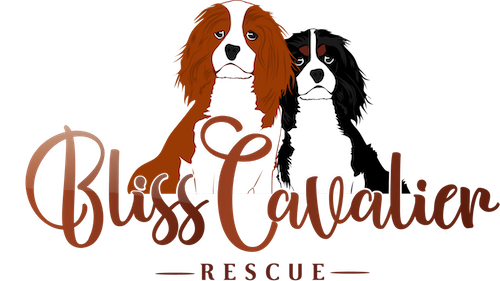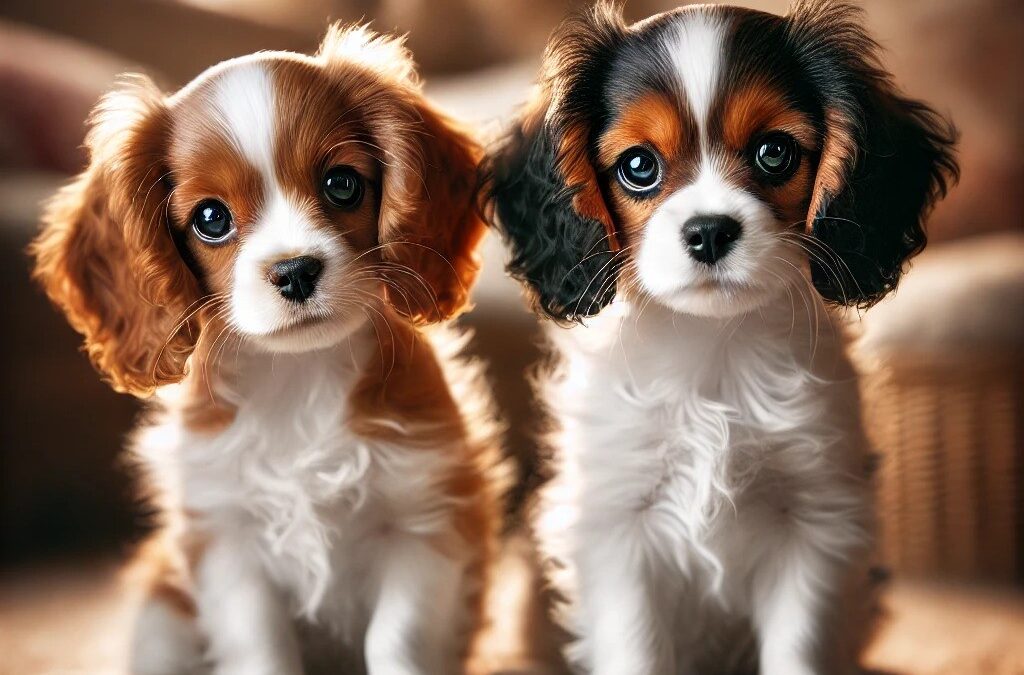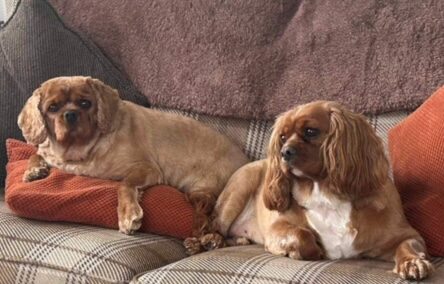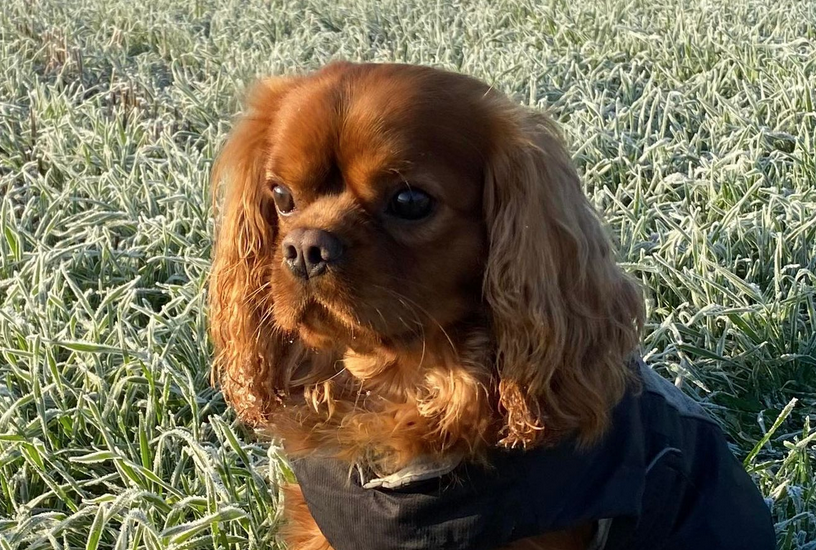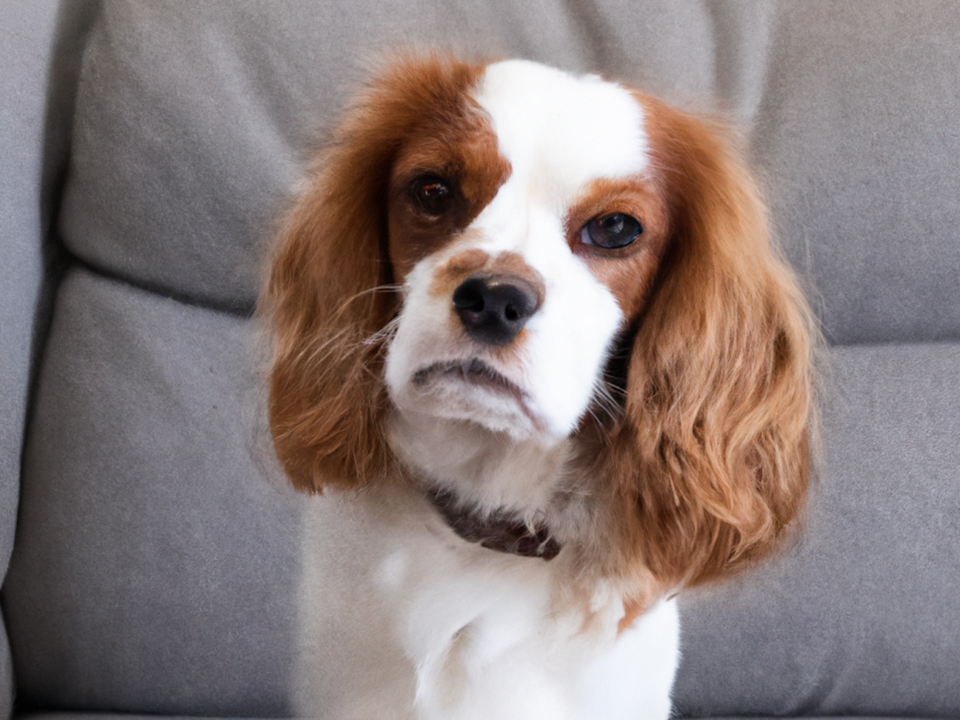Pros and Cons of owning a Cavalier King Charles Spaniel

The History of the Cavalier King Charles Spaniel
20 July 2023
Myoclonus in Cavalier King Charles Spaniels
26 July 2023When choosing a pet, it’s important to consider the pros and cons. This helps ensure the breed matches your lifestyle and expectations. The Cavalier King Charles Spaniel is a beloved breed, famed for its gentle demeanour, adorable features, and loyalty. Cavaliers do, however, come with their specific and sometimes difficult challenges.
We will explore the advantages and potential downsides of owning a Cavalier. There are some important points to consider and serious caveats. You must do your research before getting a Cavalier. If you do not buy from a breeder who tests their dogs for health issues, you may face problems. These tests should include checks for heart disease, chiari malformation, syringomyelia, eye issues, and DNA tests. You are leaving yourself open to a lot of heartbreak in the future, not to mention suffering for the dog, which should not be underestimated.
Pros of Owning a Cavalier King Charles Spaniel
Friendly and Affectionate
Cavaliers are renowned for their warm, friendly nature. They *typically get along well with children, other dogs (and many even cats), making them a good choice for families or multi-pet households.
*There is a BIG caveat to this- many Cavaliers suffer from painful chiari malformation, and this can alter their tolerance levels. Some do become aggressive, unfortunately, when they do not get their own space or are disturbed by noise. Some Cavaliers also have resource guarding issues, which is more common in Spaniels.
Adaptable
These dogs are known for their adaptability. Whether you live in a city apartment or a house in the countryside, Cavaliers tend to adjust well. They have moderate exercise needs. They need plenty of exercise, at least 2-3 miles, and daily playtime. They do need decent exercise and will not be happy or live their best life if they are stuck in a sedentary lifestyle. They love to chase birds, squirrels, etc- do not forget they are Spaniels! No Cavalier wants to be stuck inside on a sofa all day long.
Trainable
Cavaliers are intelligent and eager to please, making them relatively easy to train. They respond well to positive reinforcement methods, *typically making them a good choice for first-time dog owners. Many love agility and scent work.
*Again there is a caveat to this – Cavaliers in recent years are more commonly being surrendered into rescue with behavioural problems, often relating to neuropathic pain and bad breeding.
Companionship
Cavaliers are known for their loyalty and love for their humans. They enjoy being part of family activities and make excellent companions due to their gentle and loving nature. Still, as with any dog, their needs, including exercise and stimulation, must be met and well considered.
We have noticed many Cavalier puppies being bought as therapy dogs. People often get them for companionship. This is not appropriate for those with limited mobility or complex mental health issues and challenging behaviour. We suggest that people in this situation reach out to charities that train dogs for therapy. Here are some examples:
Many Cavaliers surrendered to rescue come from well-meaning people. These people bought a Cavalier puppy to help a child or adult as a therapy dog, but it hasn’t worked out. The dogs that the therapy dog charities have are cherry-picked and extremely well-trained in unique situations.
Cons of Owning a Cavalier King Charles Spaniel
Health Issues
One major drawback for Cavaliers is their tendency to have health problems. These include heart issues like mitral valve disease. They commonly also suffer from neurological disorders such as chiari malformation and syringomyelia. Other common health problems in the breed include dry eye, dental disease, luxating patellas, hip dysplasia and pancreatitis. Be prepared both emotionally and financially for this commitment. A good breeder can show you MRI copies for Chiari and syringomyelia. They should also provide heart test results and patella X-rays for both parents and, ideally, grandparents. DNA tests are not ‘full health testing’.
Regular vet check-ups are very important. Choosing a good breeder who tests for these and other conditions can help reduce this risk. Potential owners should be ready for possible health issues. These can still occur, even with the best intentions from breeders.
Separation Anxiety
Because of their strong attachment to their humans, Cavaliers can suffer from separation anxiety if left alone for more than a couple of hours. Therefore, Cavaliers are not the best choice for people or families who are often away from home. They are unsuitable for those who plan to leave them alone for hours while at work.
Separation anxiety is another very common reason that Cavaliers are surrendered to rescue. They are known by many of us as velcro dogs for good reason.
Grooming
Cavaliers have beautiful, silky coats but require regular grooming to keep them looking their best. They’re moderate shedders, and their ears, in particular, need regular checks and cleaning to prevent infections. You should brush them ideally daily to prevent knots from forming, which can cause them to be extremely uncomfortable.
Cost
Now the big one….
All dogs have food, grooming, insurance, and vet care costs, but Cavaliers are much more expensive due to their specific health needs. Potential health problems can lead to high insurance premiums and vet bills, and these dogs often command high prices from breeders due to their popularity and the level of testing the breeders should be doing.
Average insurance premiums for a £10,000+ a year policy are from £50-£350 monthly. These will increase as your Cavalier ages. Due to the dramatic rise in veterinary costs, we believe these premiums will continue to increase. You really do need to have a minimum of £10,000 in cover annually. For example, this would cover disc surgery, a hip replacement, or a week of hospitalisation.
Care in Older Age
Caring for a Cavalier as it ages is similar to caring for an elderly family member. You should think about the care your dog will need. It might seem a long way off, but time goes extremely quickly, and you need to be with them to provide medication at regular intervals and attend numerous vet visits and potential referrals ie cardiology and/or neurology.
Think long and hard
Cavalier King Charles Spaniels are a fantastic breed known for their adaptability, friendliness, and deep bond with their owners. However, potential owners must consider the associated challenges, particularly their grooming needs and potential health problems. As with any breed, it’s so important to understand what owning a Cavalier fully entails, ensuring they’re the right fit for your lifestyle and that you can provide them with the love and care they deserve.
They are likely to become extremely expensive in veterinary care as they age, as they commonly have several health problems that require testing and medication.
Ideally, if you are purchasing a puppy, you will get a recommendation for a health-testing breeder or a recommendation for a good rescue that ensures the dog’s conditions are highlighted before adoption and its behaviour has been assessed in a foster home. But getting a comprehensive insurance policy is so important unless you have £10,000+ to hand in savings for veterinary fees. Also, be mindful that some vets will require payment upfront and will not accept direct payments from insurers.
Many insurers will also not cover dental care. Be ready for this cost. Dental work under anesthesia is often necessary. Some Cavaliers need this procedure every two years. This procedure typically costs between £500-£2500 (in 2024).
The most common reasons Cavaliers are surrendered to rescue are behavioural issues, issues with children and the dog, elderly owners purchasing puppies and being unable to cope or owners’ inability to afford veterinary care.
FAQs About Owning a Cavalier King Charles Spaniel
- What are the key health issues to watch out for in Cavalier King Charles Spaniels? Cavaliers are prone to several health problems, including heart issues (mitral valve disease), neurological disorders (chiari malformation and syringomyelia), and common conditions like dry eye, luxating patellas, hip dysplasia, and pancreatitis. Regular vet check-ups and choosing a reputable breeder who tests for these conditions can help reduce the risks.
- Are Cavalier King Charles Spaniels suitable for families with children and other pets? Generally, Cavaliers are friendly and affectionate, making them a good choice for families with children and other pets. However, some Cavaliers may develop aggression or behavioural issues due to painful conditions like chiari malformation, so it’s essential to monitor their interactions closely.
- Do Cavalier King Charles Spaniels suffer from separation anxiety? Yes, Cavaliers can develop separation anxiety due to their strong attachment to their humans. They are not ideal for people who are away from home for extended periods. If left alone too long, Cavaliers may exhibit destructive behaviours or become stressed.
- How much exercise do Cavalier King Charles Spaniels need? Cavaliers have moderate exercise needs and enjoy activities like walking and playtime. They require at least 2-3 miles of walking daily, along with mental stimulation through activities like agility or scent work. They are not suited to a wholly sedentary lifestyle.
- What grooming requirements do Cavalier King Charles Spaniels have? Cavaliers have silky coats that need regular grooming to prevent matting and discomfort. Brushing daily is ideal, and their ears should be checked regularly to prevent infections. Additionally, Cavaliers shed moderately, so grooming is essential to maintain their coat health.
Notice: Trying to access array offset on value of type null in /var/www/vhosts/blisscavalierrescue.org/httpdocs/wp-content/themes/betheme/includes/content-single.php on line 286
